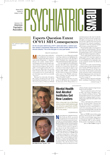Although more teens than ever are claiming they attend a drug-free school, they are still at significant risk for drug use, and they continue to cite drugs as one of their biggest concerns, according to a survey conducted early this year by the National Center on Addiction and Substance Abuse (CASA).
For the first time in the six-year history of the National Survey of American Attitudes on Substance Abuse VII: Teens, Parents, and Siblings, a majority of young people (63 percent) said that they attended a drug-free school, while just 45 percent said so in 2000. The survey measures risk and protective factors for substance abuse in adolescents.
CASA has conducted the survey annually since 1996, with the exception of last year. CASA, which is affiliated with Columbia University, is a nonprofit research center that conducts studies on the impact of substance abuse across the U.S.
Adolescents who say they attend drug-free schools are at approximately half the risk of substance abuse of teens who say they attend schools where drugs are used, kept, or sold, according to the results of the most recent survey, which the CASA released in August.
While they may state that they go to a drug-free school, when teens were asked about their biggest worry, however, drugs topped the list, with 24 percent indicating this concern. Their second- and third-greatest concerns had to do with social pressures such as “popularity” (18 percent) and with doing well in school (16 percent). Other concerns involved college admission and issues related to sexuality.
In early 2002 data were collected from telephone interviews with 1,000 randomly selected youth aged 12 to 17 and from 541 parents and guardians, of whom 317 were parents or guardians of the teens surveyed. The youth answered questions about drug, alcohol, and cigarette use, and their relationships with siblings and grandparents, among other topics.
Parents and guardians answered questions about their attitudes toward teens and drug use, including some of the factors they believe may influence drug use in young people.
This was the first year that CASA sought to better understand what effect siblings might have on a teen’s drug-use behavior. Researchers found that 67 percent of teens with an older sibling said their older brothers or sisters would be “very angry” to find out that they were using drugs.
About 12 percent of teens reported that an older brother or sister had encouraged them to use or offered them illegal drugs—these teens are twice as likely to smoke, drink, or use drugs as other teens, according to the CASA report.
The study also examined parental influence on teen drug use. Despite the report’s claim that parents are “the most important influence in preventing substance abuse among their children,” 35 percent of parents think that they have little influence over their teen’s decisions about whether to use drugs, alcohol, or tobacco.
In addition, researchers found that 43 percent of parents, but just 16 percent of teens, think future illegal drug use by the teen is “likely.”
The CASA report made a convincing plea for stronger parental involvement, citing one finding from the 2000 survey in which almost 50 percent of teens surveyed who had not tried marijuana credited positive parental influence with their decision. “Parents must play a key role in drug education, but too many continue to underestimate the power they have over their teens’ decisions about substance abuse,” Joseph Califano, Jr., said in the report. Califano is president of CASA and a former U.S. Secretary of Health, Education, and Welfare.
The National Survey of American Attitudes on Substance Abuse VII: Teens, Parents, and Siblings is posted on the Web at www.casacolumbia.org. ▪
